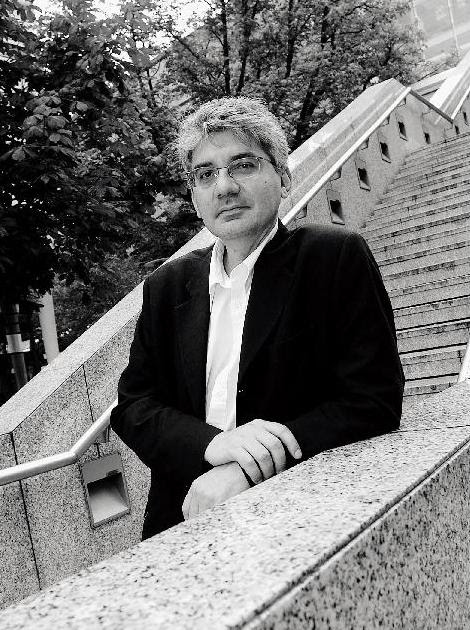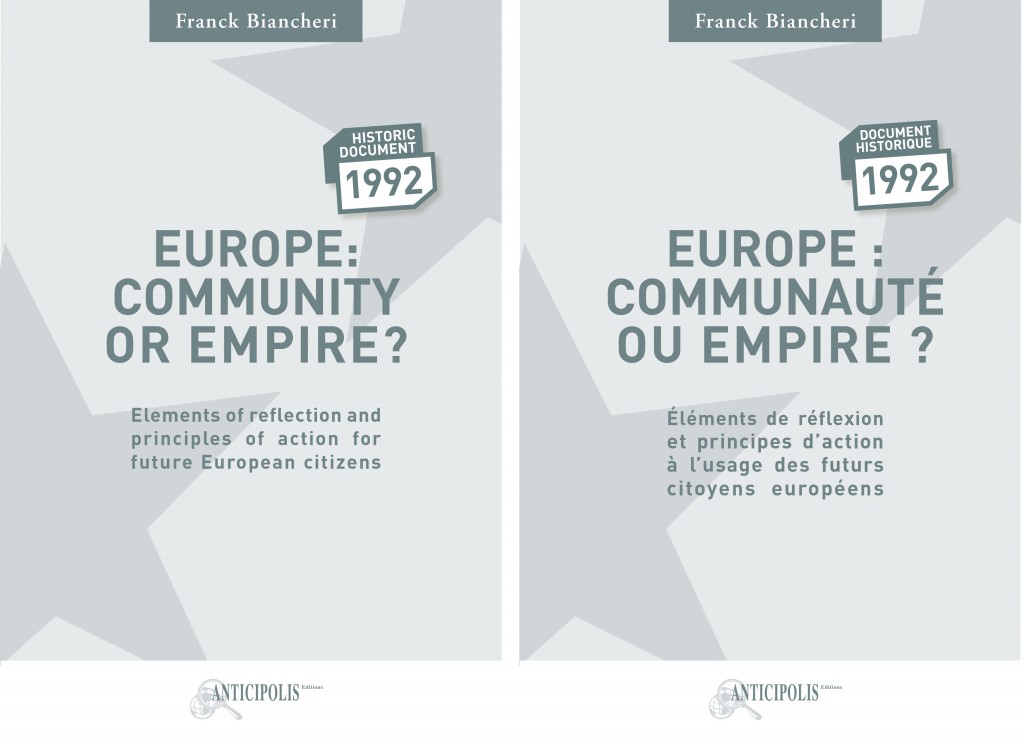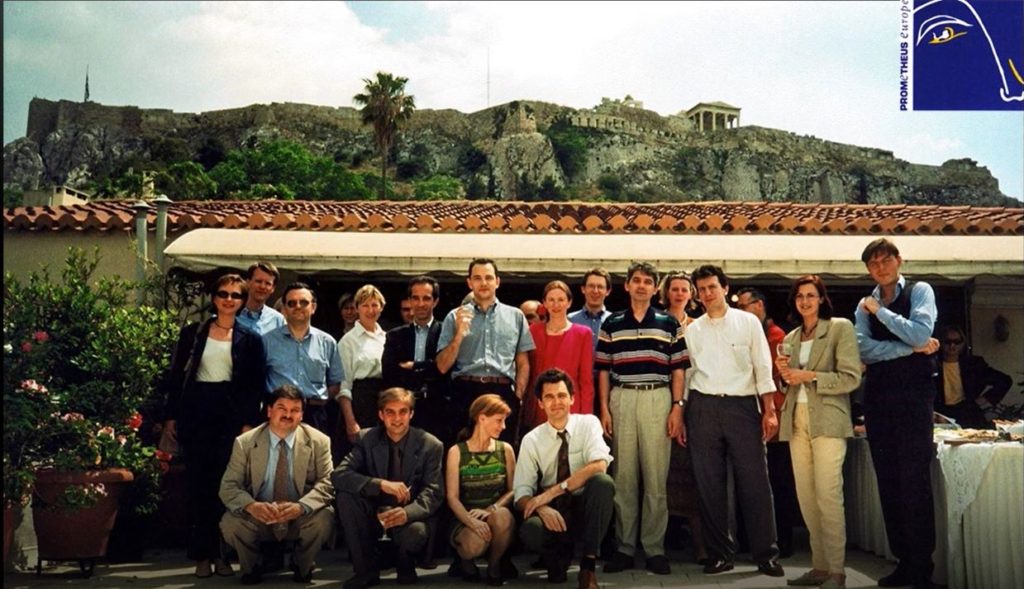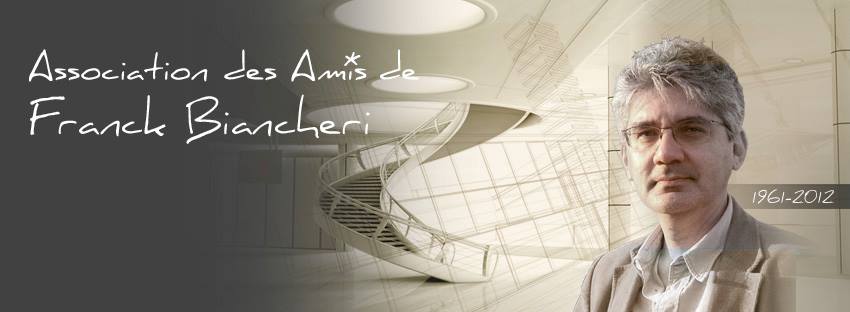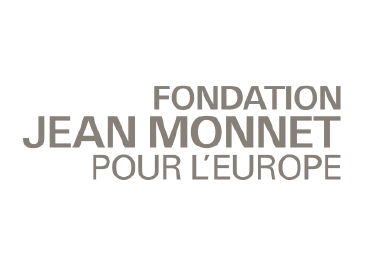A scenario elaborated by Franck Biancheri, for Europe 2020, in November 1998
Extremism in Europe is the heir of a very old couple : on the one hand the culturally nurtured fear of ‘The Other’, ‘L’autre’, and on the other hand, the deadlock of political democratic processes.
The Europeans praise themselves for being the ones shaping up a common political identity based upon the dual concepts of unity and diversity. But these two concepts have historically formed the core engine of both Europe’s most astounding successes and failures. Therefore today’s EU is walking a very fine thin line between the two and tries to build a road leading to an horizon where a perfect balance exists between the group and the individual, between duties and rights, between ‘us’ and ‘I’. This thin line is defining the democratic path Europe has been trying to pave for more than 2000 years.
Every single time the Europeans went off this path, extremism bursted out whether you call it communism, nazism or ultra-liberalism. Every single time the Europeans went off this path the fear of the ‘Other’ became dominant in Europe’s social fabric.
And indeed there is a direct link between these two consequences of the Europeans taking the ‘walk on the wild side’, as the first objective of ideologies is to put the individual into a new process where he/she will be ‘improved’, ‘adapted’. And of course such a political path implies that those who cannot be ‘improved’ or ‘adapted’ have to be ‘eliminated’. Therefore the first ones to ‘eliminate’ are ‘the others’, ‘les Autres’, those who are supposed to be too alien to be able to join the new political course.
This dual process allowed the Europeans to give to the world the ‘Anti-Lumières’, the ‘Anti- Enlightments’, by providing a conceptual framework to all those willing to get rid of groups not fitting with their ‘vision’ of the future. In a way, the Europeans preserved, by doing so, their bi-millenium status of dominant global exporters of political systems because, both the ‘bright’ and the ‘dark’ sides, were fulfilling the expectations of people and/or leaders around the planet.
Right now, Europe is facing a new challenge in that field. For the past five decades, the Europeans have been developing a new political form called the European Union. Since the Fall of the Iron Curtain and the recent enlargements of the EU to most of the continent, the construction phase of this new political ‘object’ is coming to an end. The new phase, brutally initiated by the French and Dutch people when they rejected last year the proposal for an EU Constitution, is going to determine the way this new political entity of 500 millions citizens will be governed. Will it be a bureaucracy? An oligarchy? A totalitarian regime? A democracy? Far from being obvious, the answer will be shaped by the Europeans in the coming two decades. The process will fuel and be fuelled by both the democratic and the extremist forces. One can already see how the so-called ‘EU democratic deficit’ is generating a surge of rightist and leftist extremist votes. The ability of the Europeans to prevent the ‘deficit’ to become a political vortex pushing Europe back to its ‘dark side’ of the 1930s will be the litmus test for the assessing EU’s compatibility with democracy.
The following scenario which I developed in 1998 with the think-tank Europe 2020, may help assessing what concrete forms extremism in Europe may take. In that case, it may pave the way to a racist and xenophobic EU from 2009 on.
Forecasting is a difficult art, especially when it comes to the future (Pierre DAC)
Thinking about the future only makes sense if it is aimed at improving one’s thinking about the present and about the trends at work (Franck Biancheri)
Why 2009?
The prospective analyses for the 1998-2020 period conducted in the framework of Project Europe 2020 reveals that the 2006-2010 era will constitute a new historical “node” for the EU, just as it is the case with the running 1998-2020 era. 2009 was chosen as key year due to the European election and Commission renewal planned for this date. Related to the path the EU will have taken by that time, a number of totally diverging scenario will be elaborated for the period leading to 2020.
Indeed the period around 2009 will concentrate a series of decisions and realizations that are precisely being initiated today:
- EU enlargement to the new Eastern European members;
- completed political impact of the first wave of consequences related to the introduction of the EURO (in 2004 the European institutions – EP and EC – will still essentially be the result of a pre-EURO EU);
- Generation evolution (progressive exit of generation ’68: reaching the age of 60; arrival of generation ’92: 35/45 years old), disappearing of the 2nd world war generation, increasingly aging EU population.
Many tendencies affecting the EU were born in the late 80’s, at the time of the European project renaissance. By 2009, these tendencies will have affected two complete generations thus exerting a decisive influence.
The following scenario is based on 3 hypotheses, a historical reminder and an external variable detailed down below.
Scenario: How Europe in 2009 could end up in the hands of the post modern great grand sons of Hitler, Franco, Mussolini and Petain
– In June 2009, antidemocratic and xenophobic parties will reach minimum scores of 20 to 30% in 7 Member-States out of 15.
– Thus they constitute the most important parliamentary group at the European Parliament. Via their national bases they exert a decisive influence on the political agendas of the Member-States.
– Their theories are amplified in the European Council in which half of the States have to take into consideration one third of their electorate which share these opinions. These attitudes are reinforced by the serious economic, political and social turbulence which affect the economic, social and cultural fabric of the EU since the EURO was introduced.
– The absence of radical reforms of the political and administrative system, in particular of its administrative machinery (Commission + Central Bank + Major National Ministries), has increased the bureaucratization of the EU which decisions remain in the hands of a few dozens of thousand people. The system is locked on itself and confronted to increasing difficulties in order to maintain the continuity of the European project facing a conjunction of oppositions of various natures. Without the implementation of drastic reforms, the system was never able to restore its public credibility since the repeated scandals that damaged its reputation at the end of the 90’s – beginning of 2000.
– All over the Union, the 2009 elections reveal the confrontation of forces which necessitates a complete restructuring of the European system including the suppression of a number of privileges benefiting to the European institutions. Democrats (opposed to the bureaucratic character taken by the European project), liberals (opposed to its administrated aspect), socialists (opposed to the social consequences of the implantation of EuroLand), nationalists (opposed to the post-Euro economic and cultural shocks which have placed States and regions under the political tutoring of the EU and the cultural influence of other regions/States) are brought together and attack the existing system.
– Antidemocratic and xenophobic forces offer their support to the European construction under a certain number of conditions: a closed-up Europe, defined according to religious and racial criteria, developing relations with its neighbours (Eastern Europe, Mediterranean) founded on power and exploitation of the weakest, and asserting its ability to bring back an order based on the existing administrative machinery.
– The European administrative machinery, thus following a typical progress in Europe’s history, chooses to preserve at any cost the European project while protecting its privileges and influence.
– Therefore it decides to head towards a strategy of partnership with those antidemocratic and xenophobic forces (sure as it is to be able to get rid of this circumstantially).
– July 2009 : The post-modern great grand sons (white-collar, mobile phone, Internet…) of Hitler, Mussolini, Franco and Pétain take control of the EU with the complicity of a European administrative machinery turned into a bureaucracy.
Europe 2020 has been presenting this scenario to 100 European representatives (members of Commissioners’ Cabinet, of the European Court of Auditors, Ministers’ counsellors, Brussels lobbyists, public opinion poll specialists, intellectuals…). 90% of whom declared that they had never envisaged such scenario; however they recognised that in case the European administrative and political system remains unchanged until 2009, this scenario represented a high probability of risk.
2 Hypothesis, 1 historical reminder and 1 external variable
– Hypothesis Nr 1 : In 2009, antidemocratic and xenophobic parties will reach scores between 20 and 30% in a minimum of 7 Member-States
The emergence of antidemocratic and xenophobic parties is a heavy tendency (notably initiated in France during the 1984 European elections). For the last 15 years, the rising of these extreme tendencies can be correlated to the progress of European integration. Those parties significantly utilize the European elections-weakest component of democracy in Europe – in order to reinforce their political influence. Aging populations and recurrent migration issues naturally feed theories in favor of security and withdrawing.
– Hypothesis Nr 2: The European administrative and political system does not change radically
The European administrative/political machinery, as well as the club of these 10,000 (maximum) people who make the EU today, remains stable. They face the new post-Euro era without having implemented any profound reform by 2002. It is not only a matter of political reforms (voting system, number of Commissioners, qualified majorities…), which can wait a bit as the enlargement has been postponed; it is a matter of radical reforms of the European administrative machinery. The present failures of the system (opacity, fraud, wasting, corruption, various privileges…) are maintained. Complexity increases (Commission, national Ministers, regions, various agencies…) due to a lack of reflection over the reasons and means. Faced to the post-Euro turbulence, as well as to the increasing criticisms, the system hardens in the hope that the difficult period will soon be over, each institution preferring the status-quo to a general re-questioning. In order to maintain the European construction at any cost, the machinery turns into a bureaucracy (opacity, drifting of the recruitment procedures, reinforcement of top-down processes….);
A Historical reminder: Antidemocratic and xenophobic forces of Europe have always been attracted by the European unity dream, mystic of the imperial Rome
Contrary to what appearances make us believe, antidemocratic and xenophobic parties are not necessarily anti-European, they can even be very pro-European. Indeed from the Inquisition to Hitler through Napoleon and Staline, the forces that have tried to unify Europe never put democracy at the heart of their values; it would rather be the contrary. Therefore it is legitimate to notice that :
. on the one hand, in History the dream of European unity has usually walked together with values that are at the opposite of those founding the European Union;
. on the other hand, antidemocratic and xenophobic movements, often also demagogic and opportunist, can easily gather around the defense and promotion of a united Europe : a racial, religious, locked up and antidemocratic Europe (at the opposite of that of the signatories of the Treaty of Rome).
An external variable: The evolution of transcontinental relations
In this scenario, this variable will be considered neutral. In reality, it can increase or diminish strongly the risks of major crisis for the EU by 2009. If relations between the emerging continental organizations (EU, ALENA, MERCOSUR, ASEAN, CIS, Arab World…) tend to harden as a result of the economic crisis or cultural tensions, then this scenario will see its probability increase. On the contrary, the setting up of a new planetary organization based on continental blocks engaged in vast collaborations, then its probability to happen would significantly decrease.
Franck Biancheri (Nov. 1998)
-> Download: Europe in 2009 could end up in the hands of the post modern great grand sons of Hitler, Franco, Mussolini and Petain – Franck Biancheri, November 1998 (with a forword dated 1/12/2005)
(the picture above entitled “Euro-National Politics in Fire” was created by Franck Biancheri as illustration for his article)
